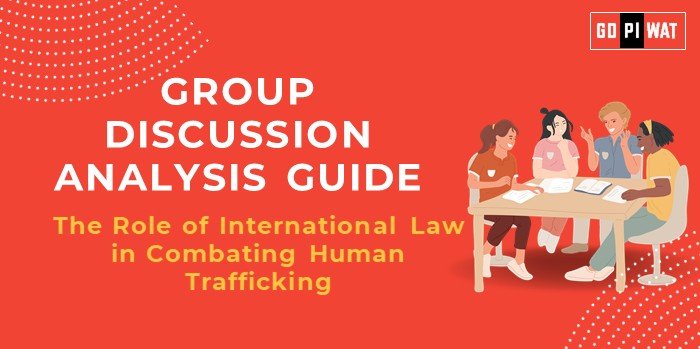📋 Group Discussion Analysis Guide: The Role of International Law in Combating Human Trafficking
🌐 Introduction to the Topic
Contextual Relevance: Human trafficking is a $150 billion global industry that enslaves over 25 million people. International law serves as a critical tool to combat this transnational crime.
Background: Instruments such as the United Nations Protocol to Prevent, Suppress and Punish Trafficking in Persons (Palermo Protocol) establish a framework for global cooperation, but challenges remain in enforcement and harmonization of national laws.
📊 Quick Facts and Key Statistics
- 🌍 Global Victims: Over 25 million people trafficked globally (ILO, 2022).
- 💰 Profitability: Human trafficking generates $150 billion annually (UNODC, 2023).
- 🤝 UN Participation: 177 countries have ratified the Palermo Protocol.
- ⚖️ Law Enforcement Gaps: Only 38% of countries report successful trafficking prosecutions (Global Report on Trafficking, 2023).
👥 Stakeholders and Their Roles
- 🌐 Governments: Enact and enforce anti-trafficking laws, cooperate internationally, and support victim rehabilitation.
- 🌍 International Organizations: Entities like the UN and Interpol coordinate global strategies and provide technical assistance.
- 🏢 NGOs: Deliver victim support, raise awareness, and advocate for stronger laws.
- 💼 Private Sector: Prevent trafficking in supply chains and support ethical labor practices.
- 🏘️ Civil Society: Drive grassroots awareness and monitor local trafficking trends.
🏆 Achievements and Challenges
Achievements:
- ✔️ Palermo Protocol Adoption: A global standard for anti-trafficking efforts.
- ⚖️ Increased Convictions: Countries like the Netherlands have improved prosecution rates by 20% (2023).
- 🤝 Public-Private Partnerships: Initiatives like the “Freedom Seal” certify ethical supply chains.
Challenges:
- ⚠️ Weak enforcement in developing nations.
- 🚨 Corruption and complicity within law enforcement.
- ❌ Lack of victim protection services globally.
Global Comparisons:
- 🇸🇪 Success: Sweden’s victim-centered approach leads Europe in low trafficking rates.
- 🌏 Struggle: Southeast Asia faces enforcement gaps despite strong legal frameworks.
Case Study: The ASEAN region launched a cross-border anti-trafficking task force, reducing regional trafficking by 10% in 2023.
📖 Structured Arguments for Discussion
- ✔️ Supporting Stance: “The Palermo Protocol has united nations in a common fight against trafficking, creating a universal legal framework.”
- ❌ Opposing Stance: “Despite international laws, enforcement gaps and lack of resources in developing nations render them ineffective.”
- ⚖️ Balanced Perspective: “While international law is foundational, its success depends on robust national enforcement and international cooperation.”
💡 Effective Discussion Approaches
- Opening Approaches:
- “Every year, 25 million victims fall prey to human trafficking. How can international law better prevent this tragedy?”
- “Despite legal frameworks like the Palermo Protocol, human trafficking remains one of the fastest-growing crimes.”
- Counter-Argument Handling:
- “Acknowledging enforcement gaps, how can international organizations provide capacity-building?”
- “While corruption hinders progress, transparent reporting mechanisms can ensure accountability.”
🔍 Strategic Analysis of Strengths and Weaknesses
- ✔️ Strengths: Global legal frameworks; heightened awareness; increasing private-sector involvement.
- ⚠️ Weaknesses: Enforcement inconsistencies; funding shortages; cultural barriers.
- 📈 Opportunities: AI for trafficking detection; stronger regional collaborations; victim rehabilitation programs.
- 🚨 Threats: Digital tools aiding traffickers; political instability; corruption.
🎯 Connecting with B-School Applications
- 🌟 Real-World Applications: Topics like governance reform and ethics in global supply chains can inspire business models.
- 📋 Sample Interview Questions:
- “How can global businesses ensure compliance with anti-trafficking laws?”
- “What role can public-private partnerships play in eradicating trafficking?”
- 💡 Insights for Students: Explore projects focusing on ethical leadership, law enforcement innovations, and human rights.


